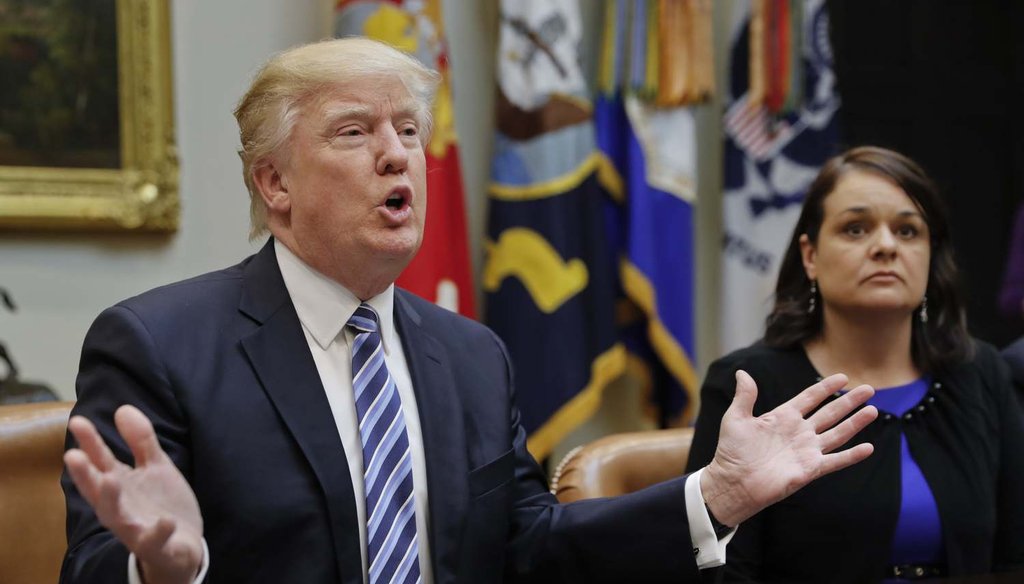Stand up for the facts!
Our only agenda is to publish the truth so you can be an informed participant in democracy.
We need your help.
I would like to contribute
Despite promise, Trump supports Obamacare replacement that would cut Medicaid

Carrie Couey, from Colorado, listens at right as President Donald Trump speaks during a meeting on health care in the Roosevelt Room of the White House on March 13, 2017. (AP Photo/Pablo Martinez Monsivais)
On the campaign trail, President Donald Trump promised that he wouldn't make any cuts to Medicaid, the government-run health insurance program that primarily serves poor Americans.
But two months into his presidency, he has endorsed a House Republican bill that would reduce federal spending on Medicaid by $880 billion over 10 years, 25 percent less than under current law, according to an analysis by the nonpartisan Congressional Budget Office. The bill is the American Health Care Act, House Republicans' leading proposal to replace the Affordable Care Act, or Obamacare.
"The House bill to repeal and replace Obamacare will provide you and your fellow citizens with more choices — far more choices at lower cost," Trump said during a March 13, 2017, event to promote the bill.
Trump didn't mention that some of the largest changes the bill makes have to do with Medicaid, a program that preceded Obamacare by more than 40 years.
Individual states administer their own Medicaid programs, but they share the financial burden with the federal government. There are two main provisions of the House Republican proposal that affect federal spending on Medicaid.
First, it scales back enhanced federal funding for 31 states that expanded Medicaid eligibility requirements, as permitted by the Affordable Care Act. If the law passes and the states don't revert to their old eligibility requirements, it could force states to pay a much larger share of the costs.
The Republican proposal also places a cap on spending per Medicaid enrollee. Under current law, state governments reimburse medical providers who serve Medicaid patients, and the federal government in turn reimburses state governments for a portion of those costs. The proposal would limit the federal government's spending to a per-enrollee amount, based on the consumer price index for medical care, a way of measuring price changes among medical products and services. This might force states to decide whether to limit the services they offer or put more of their own money into Medicaid.
The CBO predicts that these changes, among others, will result in 14 million fewer Medicaid enrollees — there are currently 68.6 million enrolled — which would also cause the federal government to spend less on the program.
Of course, this bill is in its early stages, and there are several indicators it might not even make it past the House of Representatives. And if it does become law, the Medicaid cuts wouldn't start until 2020. But because Trump is pushing hard for Congress to pass it, we're rating his promise not to cut Medicaid Stalled.
Our Sources
CBO, American Health Care Act cost estimate, March 13, 2017
Washington Post, "The GOP health-care plan would quietly kill the Medicaid expansion. Here's how." March 9, 2017
Kaiser, "Compare Proposals to Replace The Affordable Care Act," accessed March, 14 2017
House Energy and Commerce Committee, AHCA section-by-section summary, accessed March 14, 2017
Brookings, "Expect the CBO to estimate large coverage losses from the GOP health care plan," March 9, 2017
Georgetown Center for Families and Children, "What Does House ACA Repeal Proposal Mean for Children and Families?" March 7, 2017
CBPP, "House GOP Medicaid Provisions Would Shift $370 Billion in Costs to States Over Decade," March 7, 2017
PolitiFact, "Mick Mulvaney's misleading claim that House GOP health care plan keeps Medicaid expansion," March 14, 2017
